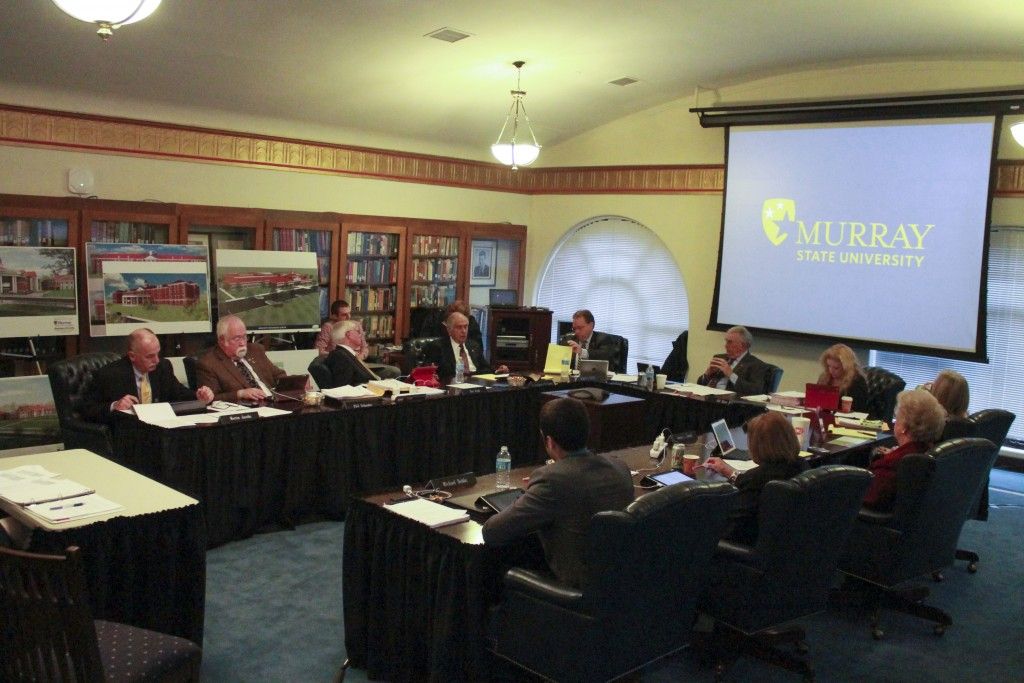
The Jesse Stuart room in Pogue Library was a full house Friday as the Board of Regents met to discuss topics such as the Tennessee Valley Authority contract, tuition increases, Waterfield Library renovations and the campus tobacco policy amongst others.
UPCOMING CHANGES
With last week’s closures fresh on their minds, the regents approved negotiations with Tennessee Valley Authority, or TVA, regarding a contract renewal. The contract, called 5MR, allows TVA to require the University to shutdown power within a five-minute notice during cold temperature to save power.
While the contract has caused issues in the past for the University, the regents voted to approve the negotiations based on recommendations that the contract is financially beneficial to the University with savings of approximately $400,000.
Additionally, the University is prepared for losing power with generators, which will be tested monthly on Sunday mornings.
The contract, if agreed upon by the University, will not extend beyond five years.
The Board of Regents also approved the campus tobacco policy 8-1, which will begin implementation as of Aug. 5, 2015.
President Bob Davies said the date of the ban was chosen specifically for ease of transition because it aligns well with the ending of summer courses.
With five months looming until August, the policy may need adjustments after implementation, to which the board agreed upon a review of the policy after a year.
“It’s not going to be a perfect policy,” said Regent Constantine Curris.
Along with the new policy comes a repercussion of violating the ban and what that means for students, specifically warnings and fees.
“The committee felt it should be more of an educational process instead of a punitive process,” Davies said of the tobacco free implementation steering committee.
With violation of the ban, Davies said there will be verbal warnings, written warnings and sanctions, but added that while students were in favor of a fee, many said there was not an amount high enough that could drive the repercussion home.
While official implementation will not begin until August, Spring Break will mark initial stages of developing tobacco-free zones, which will be established within 25 feet of doors and windows throughout campus.
Another change student will see is the cost of tuition at Murray State. While still remaining one of the cheapest in the state, will increase by 3 percent for the 2015-16 academic year, President Bob Davies said.
“This increase should not be a surprise to anyone a this institution or at this table,” Davies said.
At $108 per semester, the increase boils down to an additional $6.75 per week for students.
DOWN THE ROAD
Warren Edminster, director of the Honors Program, said he hopes an Honors College will be established by fall 2016, a hope that may come to fruition with the regents’ recent approval.
The Honors Program will transition into an Honors College by that date, as approved by the board, with a floor or wing of a residential college designated for those students.
While the residential college has not been selected at this time, the Strategic Initiatives plan for the University also aspires to increase the total number of honors students by 25 percent in addition to the development of the Honors College.
The Board of Regents voted unanimously to also approve a six-year library renovation and expansion plan for Harry Lee Waterfield Library.
Changes to the library will reflect what present and future students want, Jay Morgan, vice president of Academic Affairs, said.
Morgan said students want a library with the feel of a coffee shop: a place to bring a laptop or tablet and work in groups of three to four.
“It will be like Starbucks on steroids,” Morgan said.
Plans for the library include a 50 percent increase in available study space, additional flexible spaces for technology, improvements to the media library and combined and enhanced writing and communications centers.
Morgan said the renovations are necessary to supporting more than Murray State’s main campus.
“We’re looking at how can one library support five campuses,” he said.
The expanded Waterfield Library will be a resource for the main campus and the Paducah, Hopkinsville, Madison and Henderson campuses.
The library’s expansion coincides with rising university enrollment. For spring 2015, enrollment jumped 3.5 percent from spring 2014.
That number could drop by 160 or more with tougher admissions criteria for freshmen coming down the pipe.
High school seniors scoring less than an 18 on the ACT or a 870 on the SAT will not be admitted as a full-time student under the still-budding plan.
“Eighteen was where there was a clear mark that these students aren’t really successful,” Fred Dietz, associate vice president for enrollment management, said.
Future Murray State students would be categorized into four tiers under the plan, each tier labeled by testing scores and areas of developmental requirements, Dietz said.
- Tier I is unconditional acceptance. With at least an 18 on the ACT or an 870 on the SAT and all developmental requirement met, students will be admitted without restrictions.
- Tier II is conditional acceptance. It’s for students with adequate ACT or SAT scores but still have an unmet developmental requirement.
- Tier III is admittance to Pathways To Success. Students meeting the test score requirements but with two or more developmental requirements unmet will be admitted to a program to help them meet the requirement.
- Tier IV is admittance to a 12-15 hour certificate program leading to Pathways To Success, then potentially to full enrollment.
Tier IV is not expected to be a popular option for applicants, Dietz said. Instead many will opt for cheaper community colleges in the region.
The next Board of Regents meeting will be held June 5, 2015.
Story by Amanda Grau, News Editor, Mary Bradley, Editor-in-Chief


























































































